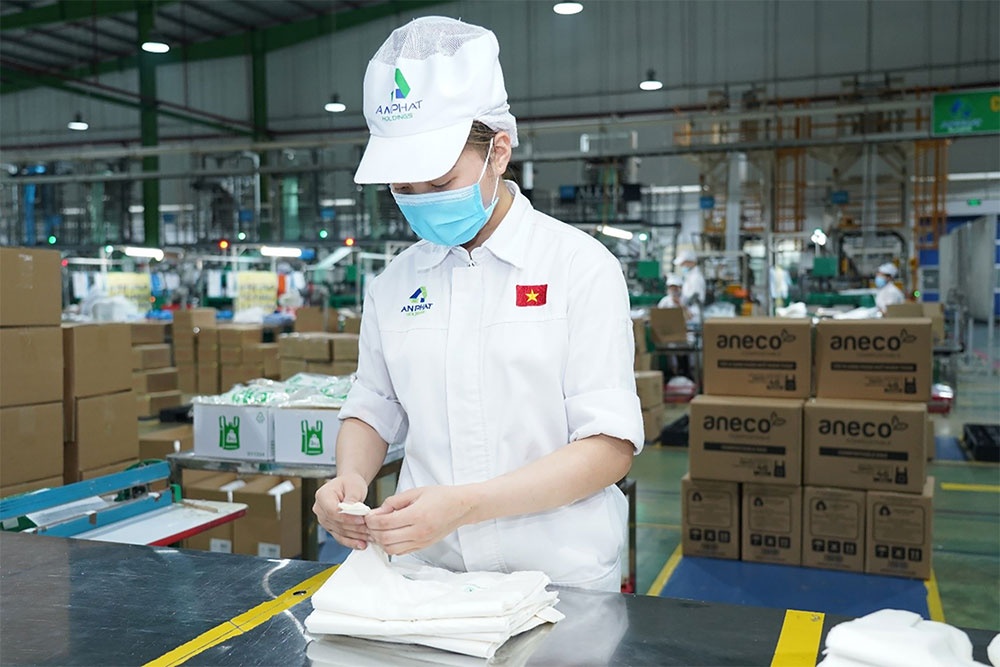Crafting fresh sustainable initiatives
These criteria have garnered interest from various audiences, providing the impetus for organisations’ efforts to integrate environmental, social, and governance (ESG) in practice. Investors, banks, insurers, and regulators are increasingly looking to invest in “good” companies for sustainable investment. Consumers prefer to purchase goods and services from such companies with a sustainability orientation. Environmentally, socially, and economically responsible business practices are no longer an option but a must for the company in pursuing sustainable development and capital attraction.
 |
| Vu Thi Thinh - LNT and Partners and Nguyen Van Hai Dang - LNT and Partners |
According to a report on ESG readiness in Vietnam in 2022 by PwC and VIOD, two-thirds of enterprises are implementing ESG programmes, a quarter have a clear governance structure, 35 per cent have active board involvement on ESG issues, 28 per cent have clear ESG risk metrics to track progress, and 71 per cent lack understanding of the data required for reporting.
As it turns out, ESG implementation in Vietnam remains relatively low and directionless. Despite initial scepticism, businesses in Vietnam have come to see the merits of implementation. Nevertheless, it can be challenging for businesses to accomplish their goals without a solid governance framework.
Role of ESG and CDM
ESG facilitates enterprises’ access to finance and attracts investors with financial incentives. Disclosure of ESG information is a prerequisite for companies to launch an initial public offering (IPO) in Vietnam. ESG also offers opportunities to Vietnamese enterprises to perform IPOs in global markets, resulting in significant efficiency when attracting investment.
Furthermore, through adopting an initiative to promote ESG practices, small and emerging companies can obtain technical support packages or further assistance from the Ministry of Planning and Investment and the US Agency for International Development (USAID).
 |
| Many companies are now aiming to be stronger in sustainability for their employees and not just for profit, Photo Le Toan |
Some investment firms are increasingly applying ESG compliance as a prerequisite for funding. Dragon Capital has upgraded its ESG strategy and created a grading mechanism for listed companies back in 2015. Tundra Frontier, a frontier market fund, prioritises ESG-related investing and AFC Vietnam Fund announced that it would start applying eight ESG criteria from 2021 to evaluate investment opportunities in businesses.
Businesses implementing ESG are eligible for financial incentives, especially those with environmentally beneficial initiatives or on the green classification list. Accordingly, investors will have access to green credit. In addition, such businesses can obtain money by issuing green bonds and benefit from preferential service rates in the securities sector and other preferential policies in compliance with the legislation.
In addition to ESG, various initiatives have been undertaken in the united endeavour to foster sustainable development. While ESG serves as a measurement tool in investment decision-making, a clean development mechanism (CDM) is an incentive mechanism for enterprises, assuring climate change mitigation while fostering economic efficiency and advancing energy transition. CDM has become a tool for implementing national environmental policies in many countries participating in the Kyoto Protocol, and Vietnam began issuing official decision on the matter back in 2007.
A CDM project uses innovative, sophisticated, and environmentally friendly technology, resulting in the reduction of greenhouse gas emissions approved for registration by the International Executive Committee on CDM (EB), and granted Certified Emissions Reductions (CERs). When the project comes into operation, its benefits are exchanged through CERs and profits will be obtained from the purchase, sale and exchange of CERs between developing and developed countries.
The scope of CDM projects covers prominent fields such as energy production and transmission, agriculture, construction, waste treatment, chemicals, and manufacturing. In order to encourage enterprises to participate, the government has introduced incentives for CDM projects, notably incentives for corporate income tax, land rent, or use fees; import tax exemption; giving priority to product consumption; and lending support for those that have been approved for registration by EB and countersigned CERs purchase contracts.
The Vietnam Environment Protection Fund also subsidises products, including electricity generated from wind, solar, geothermal, and tidal. Electricity is generated from methane recovery from landfills and coal mines when the products simultaneously meet the subsidy conditions. Project owners are also exempt from tax on income from the first sale/transfer of CERs.
CDM project application
To get certified as a CDM project, a company needs to firstly appraise the project through a designated organisation by EB, ensuring that the project will reduce emissions with quantifiable emissions in the long term.
Secondly, the company will register the project with EB to be awarded CERs, then the company needs to apply for a letter of approval issued by the Ministry of Natural Resources and Environment to be recognised to contribute to the sustainable development of the country.
In 2016, Vietnam ranked fourth in the world in terms of the number of projects, with more than 250 CDM projects recognised by EB. Meanwhile, emissions reduction ranked 11th in the world with more than 10 million tonnes. As of July 2019, the total amount of fees collected for selling/transferring CERs is VND45.5 billion ($1.98 million) from more than 56 CDM schemes.
Since 2016, the implementation of CDM has slowed due to problems relating to administrative processes in granting letters of confirmation and letters of approval for projects. Additionally, businesses also encounter difficulties in obtaining favoured conditions under Decision No.130/2007/QD-TTg due to policy incoherence.
Firstly, participants have experienced difficulties in obtaining financial support for the preparation of project design documents (PDDs). By implementing the project, the participants are financially supported up to 30 per cent of the total investment to prepare PDDs. However, this financial support shall be returned to the environmental protection fund upon selling CERs. Additionally, gathering the documents for evidencing the project’s expenses is somewhat burdensome as several documents are required to conform with foreign forms and regulations.
Secondly, participants have difficulties gaining access to tax incentives. Even though the preferable conditions for CDM project implementation are established in Decision 130, the applicable tax laws do not provide specifics or guidelines for this subject, constraining the project implementer’s access to tax impetus.
Thirdly, the administrative procedures relating to the implementation of CDM or access to its incentives are still overly burdensome and costly. Additionally, there is a lack of practical and comprehensive guidance for participants.
One of the initial steps to tackle these existing hurdles is to develop comprehensive guidance for businesses conducting CDM projects to ensure their access to incentives and curtail redundant administrative procedures for CDM development.
Besides this, the development and amendment of regulations on CDM must consider the newly promulgated regulations on the carbon credit market under Law on Environmental Protection 2020 and its implementing Decree No.06/2022/ND-CP. Only then can policy coherence be assured.
| Why integrate ESG plans into business? Dealmaking potential ripe in Vietnam for ESG-minded groups How real estate developers can benefit from ESG considerations |
What the stars mean:
★ Poor ★ ★ Promising ★★★ Good ★★★★ Very good ★★★★★ Exceptional
Related Contents
Latest News
More News
- Masan Consumer names new deputy CEO to drive foods and beverages growth (February 23, 2026 | 20:52)
- Myriad risks ahead, but ones Vietnam can confront (February 20, 2026 | 15:02)
- Vietnam making the leap into AI and semiconductors (February 20, 2026 | 09:37)
- Funding must be activated for semiconductor success (February 20, 2026 | 09:20)
- Resilience as new benchmark for smarter infrastructure (February 19, 2026 | 20:35)
- A golden time to shine within ASEAN (February 19, 2026 | 20:22)
- Vietnam’s pivotal year for advancing sustainability (February 19, 2026 | 08:44)
- Strengthening the core role of industry and trade (February 19, 2026 | 08:35)
- Future orientations for healthcare improvements (February 19, 2026 | 08:29)
- Infrastructure orientations suitable for a new chapter (February 19, 2026 | 08:15)

 Tag:
Tag:




















 Mobile Version
Mobile Version